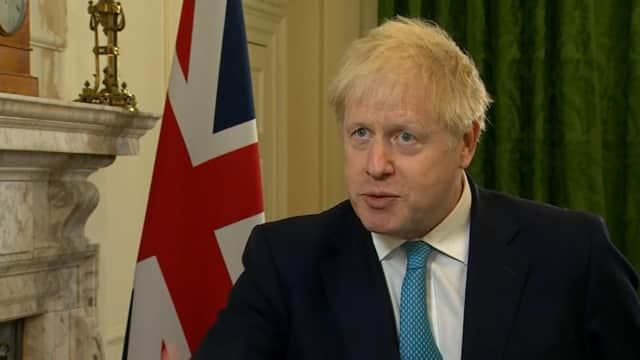Boris Johnson can preserve the Union by getting Brexit right - Brian Monteith


Boris Johnson has done the right thing. The negotiations were going nowhere; every time there was any sign of progress the EU would re-open old discussions previously thought to have been settled – such as on protocols around food products going from mainland Britain to Northern Ireland or declaring while British waters were considered sovereign the fish in them belonged also to 27 EU member states.
The haughty arrogance and disrespect displayed towards our country had never left the EU negotiators and could be seen in the Council of Minsters too. It was time to reset the dial and Johnson has achieved that.
Advertisement
Hide AdAdvertisement
Hide AdThe door has been left ajar and there remains the prospect that the EU will at last begin to negotiate in good faith – bound as it was by the terms of the Withdrawal Agreement that demands best endeavours.
But are we being told the actual truth – or some charade to pretend both sides are batting for their respective constituencies, only then – miraculously – to find a compromise both can claim as a victory? Apologies for what appears like weary cynicism but that’s how the UK’s position is being described by observers in Brussels.
There are three lessons I take from the last week’s events.
The first is if the Prime Minister is serious and believes the EU is no longer sincere in seeking a Canadian-style trade deal then he must complete the job by beginning the process of repudiating the Withdrawal Agreement so the UK is no longer bound by it, for it is not generally understood that it remains in place even after the Transition Period finishes without a deal.
Only by revoking the Agreement – which the UK is legally entitled to do under UN Article 2625 on Self Determination – will we be able to stop the payment of billions (the amount of which remains a secret) to the EU as well as avoid turning Northern Ireland into a province of the EU. If the Prime Minister does not soon commence this process then he will be revealing there is no rupture in the negotiations, just a break for tea and sandwiches.
The second lesson is we must escalate all efforts to deliver and promote the benefits of Brexit that do not rely on any trade deal. Opening Freeports to create badly needed jobs; restoring capacity for fishing and processing with a three year plan; ensuring new Royal Fleet Auxiliary orders are placed with British shipbuilders; restricting smaller public sector tenders to local suppliers – all policies that would benefit Scotland and show Brexit helps the whole UK.
Thirdly, while we have had a legal separation of sorts, over four years on from the 2016 referendum the settled terms of divorce seem as elusive as ever – with calls still being made for yet more time.
The government’s prevarication in No deal planning, the repeated attempts to overthrow the democratic will of the British people and the unwillingness of the EU to negotiate seriously in the belief (partly fed by the likes of Sturgeon, Blair and Major) that we would change our minds has dragged the process out.
If anyone believes if Scotland ever chooses to break from being British the subsequent divorce could be organised within 18 months – and without great pain and bitterness – then they are deceiving themselves and anyone they say this to.
Advertisement
Hide AdAdvertisement
Hide AdThere would be great capital flight immediately before any referendum as people protect their moveable assets against the risk of them becoming hostage to a new country desperate for funds and willing to raise taxes to obtain them. This great flitting would become a stampede as businesses re-registered in England.
There would be great division in Scotland as regional jurisdictions that voted to remain British appealed to London to remain so – how could they be abandoned to a fate they wished to have no part of?
Rather than partitioning the UK the SNP would achieve the partition of Scotland – taking us back centuries to divisive times when Scots regularly turned on Scots over religion, politics, and fealty to one leader or another.
And Scotland would go bust very fast. Without the teat of HM Treasury Scotland’s public finances would run out in short order. Not only is the Scottish tax base very narrow it is very mobile, leaving the majority of the population employed in the public sector directly, or indirectly (such as in an agencies or the many branches of academia or the third sector community) not knowing from month-to-month if their salary cheque would be paid.
My point is that to settle the many questions over personal solvency, partition, public finances and more (such as asset and debt transfers, border arrangements, trading agreements and access to the largest market of our friendly neighbours) would take far longer for the three-centuries-old Anglo-Scottish union than it has for the four decades-old relationship between the UK and EU.
Brexit is not yet done, but if done right the lessons from it make secession harder and will preserve the union – not break it. This is why Johnson must deliver on his promises.
Brian Monteith is a former member of the Scottish and European parliaments and a public relations consultant of over thirty-five years – working in Africa, South Asia and the Caribbean as well as Scotland and the City of London.
Comments
Want to join the conversation? Please or to comment on this article.